 by Cheryl Eagan-Donovan
by Cheryl Eagan-Donovan
This year’s festival saw fewer attendees than last year’s 25th anniversary edition, but the stars were out in full force nonetheless. The weather for the 1 p.m. ferry ride from Boston on Wednesday was picture perfect but the usual crowds of filmmakers and film aficionados were missing. I checked into my hotel before picking up my pass at the box office, where I met talent relations rep Harlan Gulkco, then rendezvoused with Provincetown Film Society board member and Chlotrudis Film Society President Michael Colford. He suggested Helltown for dinner, an excellent choice for fresh seafood, salads, and cocktails, where we talked about our latest projects before heading to the Town Hall.
The opening night film, Outstanding: A Comedy Revolution, featuring a cast of top queer and mostly female-identifying comics, was a comprehensive look at the history of the genre and its stand-up and -out leaders. Directed by Page Hurwitz, the film features archival footage and interviews with legends Lily Thompson (a frequent visitor to Provincetown), Margaret Cho, Sandra Bernhard, Wanda Sykes, and Eddie Izzard, whose new one-woman Hamlet has taken London by storm. Performance footage also showcases newcomers Joel Kim Booster (this year’s New Wave award winner) and Trixie Mattel, as well as local favorite Judy Gold. A little long for a doc at 100 minutes, the film packs in some fabulous clips of pioneers Robin Tyler and Richard Pryor, and culminates with an event at the Hollywood Bowl featuring most of the comedians profiled in the film appearing at a one-night only celebration of the power of humor to change the world.
In the Q&A, the director talked about her own experience, starting out working at Josie’s in the Castro in San Francisco, and explained how she went to Netflix with the idea of doing a TV comedy special, which became the nexus for the film. Hurwitz then spent for years doing research, and quipped, “time is your enemy in doc filmmaking”. Judy Gold said “this story has never been told” referencing the film’s premise that queer comedians led the revolution in America, winning hearts and minds with the idea that it’s okay to laugh at ourselves and ultimately affirming that a queer life can be a life that’s joyful, something that seemed impossible not so long ago. The post-screening discussion concluded with the consensus from the cast and director that with the next generation, “queer comedians are leading the way and refashioning the genre”.
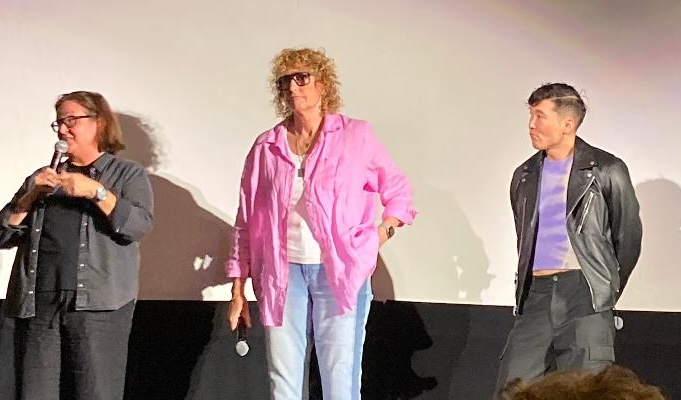
The opening night party at the Crown and Anchor poolside was perfect for networking. I caught up with former Women in Film president Alecia Orsini who has been working on lots of local films, including PIFF selection High Tide, shot in Provincetown. Hurwitz made an appearance, as did several local luminaries. Unlike some years, there was a great selection of appetizers and desserts, and Chlotrudis members Michael Colford, Beth Curran, and I enjoyed a few cocktails and more networking before calling it a night. I took a cab back to my hotel at the far-east end of town.
On Thursday morning, I took a quick walk on the beach then into town for the conversation with Oscar-nominated and PIFF award winner Colman Domingo. Killer Films producer Christine Vachon conducted the interview and presented the Excellence in Acting award to the actor. Domingo is a wonderful speaker, engaging and genuine, insightful and modest. He talked about his career to date, explaining that he had wanted to be a journalist. When he was at Temple University his mother suggested that he take an acting class to help overcome his shyness. To his surprise he excelled at it. He moved to San Francisco and began his journey to becoming a writer, director and producer. He said an agent told him “you’re a character actor in a leading man’s body.”
His big break came when he was with TheatreWorks in the San Francisco Bay area in Blues for an Alabama Sky in the late 90s, which then lead to a role in Passing Strange, first at the Berkeley Rep, then Off-Broadway and finally on Broadway in 2008. He talked about losing his mother and having another breakthrough moment when he sang, “He’s Able” at the audition; he said his heart and mind burst open and he became a more raw performer. Going forward, he says he never put himself in a box. “I kept shape-shifting. I’m wily, learning, possibly failing at things”. Domingo comes across as truly fearless. He next break was the film Rustin where he not only played the lead but took an active role in promoting the film. His performance earned him an Academy Award nomination, about which Vachon said, “You and I made it to the Academy Awards – a little late but we made it!” She was nominated as producer of Celine Song’s Past Lives. On the importance of telling of Bayard Rustin’s story, Domingo said he saw the film as an opportunity to show the complexity of his life: his intelligence, wit, sexuality, and messy relationships. Rustin was not just a trope. He said a felt a great responsibility: “I had to be the soul of the film.” He hopes in will be shown in schools, and as an educator, I agree: it is an important film.
He talked about how much he likes directing; he started by directing theater, then television, and announced he will soon direct his first feature film. He said, “I love the spark and collaborating.” On his most recent film, Sing Sing, which is screening at the festival, he was also an executive producer along with his husband Raul. He explained that the message he connected with is that art transforms and saves lives; it gives us a path to humanity. They shot the film in 18 days, in between filming The Color Purple and pick-ups for Rustin.
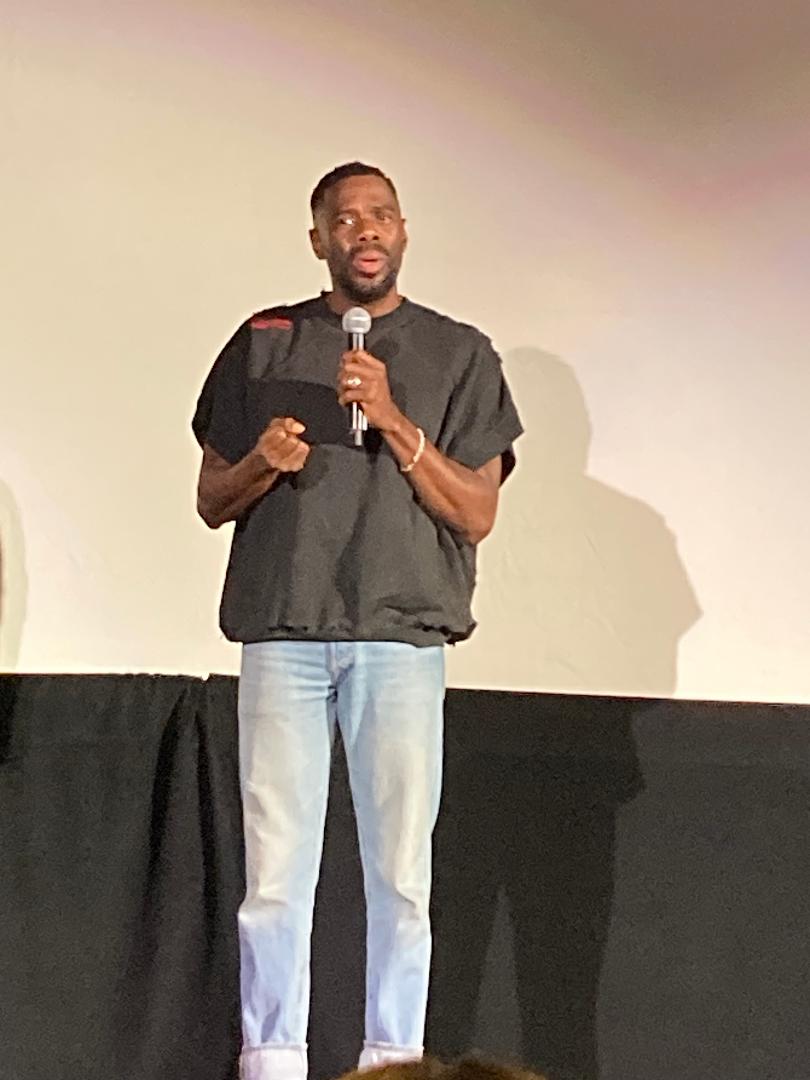
Vachon asked him asked what makes a good director, and he immediately called out John Waters, who was sitting across the aisle from me. “You’re the sun and the moon,” Domingo said to Waters, “your work challenges and inspires me to let my freak flag fly!” He said he would love to make a film with Waters. Asked by an audience member if he feels the need to be a spokesman for political and social justice causes, Domingo replied, “I want to let my work be the revolution.”
Vachon presented the award to the actor, who then called Waters up onto stage for what was a great photo opp – three legends together. This conversation was one of the highlights of the festival for me.
A quick lunch at Gabriel’s, home of the festival hospitality suite for filmmakers and sponsors, and then to the Town Hall for Sing Sing. I had missed it on opening night at SXSW and again at IFFBoston, so I was really excited to finally see it at PIFF. Coleman Domingo stars as a wrongly convicted prisoner at the title facility in New York who leads a group of fellow inmates in a theater program. The troupe decides to write an original comedy for their next production, a mash-up of genres including Shakespeare’s Hamlet. Based on a true story, and featuring several former Sing Sing inmates who had participated in the Rehabilitative Theater Arts (RTA) program, the film is electric, brimming with authenticity and pathos. We follow the group of players as a new inmate joins them, stirs up conflict but eventually finds his way to the art form and its power. The parallel story of Divine G, Domingo’s character, and his struggle for clemency, is riveting and heartbreaking.
During the Q&A Domingo talked about shooting in upstate New York and getting to know the guys. He explained that 95% of the cast had gone through the theater program, and that its participants have a 2% reincarceration rate. He said he tried to create an “everyman” with his character John “Divine G”, so that audiences could see the world through his eyes, and ask what would happen if this happened to me? The real person his character is based on believed in the process and maintained tremendous faith that he could get out of the system, making his quest universal. He talked more about his background and commitment to the project. He said, “I’m a theater rat and I know how it can heal; I love theater and Shakespeare”. He mentioned the film’s opening speech from A Midsummer Night Dream and talked about trying to capture the raw energy of a Cassavetes film. It succeeds spectacularly. The film opens in theaters in July: absolutely an Academy Awards contender.
My next film was the documentary The Little Pageant that Could! about the Los Angeles “Best in Drag” show that evolved over the years into an annual fundraising event to fight AIDS during the height of the crisis. Fabulous archival footage documents the origins of the event in the living room of a few friends as a mock Miss America pageant. Director John Carlos Frey was the first director of the show when it moved to the Richard Pryor Theater, where Hollywood celebs including Jennifer Coolidge, Julia Louis Dreyfus, and Bob Mackie started showing up in the audience and serving as hosts and judges. Over thirty-three years, the pageant raised more than $6 million for the Alliance for Housing and Healing, and became the longest running drag benefit event in L.A. history. Patrick Rush, featured in the film, explained in the Q&A that their editor went through 32 years of film and video to tell the story, and the result is a chronicle that celebrates the power of drag to do good. Emmy-winning World of Wonder (W.O.W.), producers of Ru Paul’s Drag Race, have positioned this film to fight the recent legal attacks on drag performers throughout the United States, but one of the charms of the film is that it maintains that campy, amateur bravado that made the pageant a great success. The audience at the Town Hall responded to the pure nostalgia and the reminder of the tragedy of the many lost lives with love and gratitude for the filmmakers. An emotional but thoroughly entertaining time capsule.
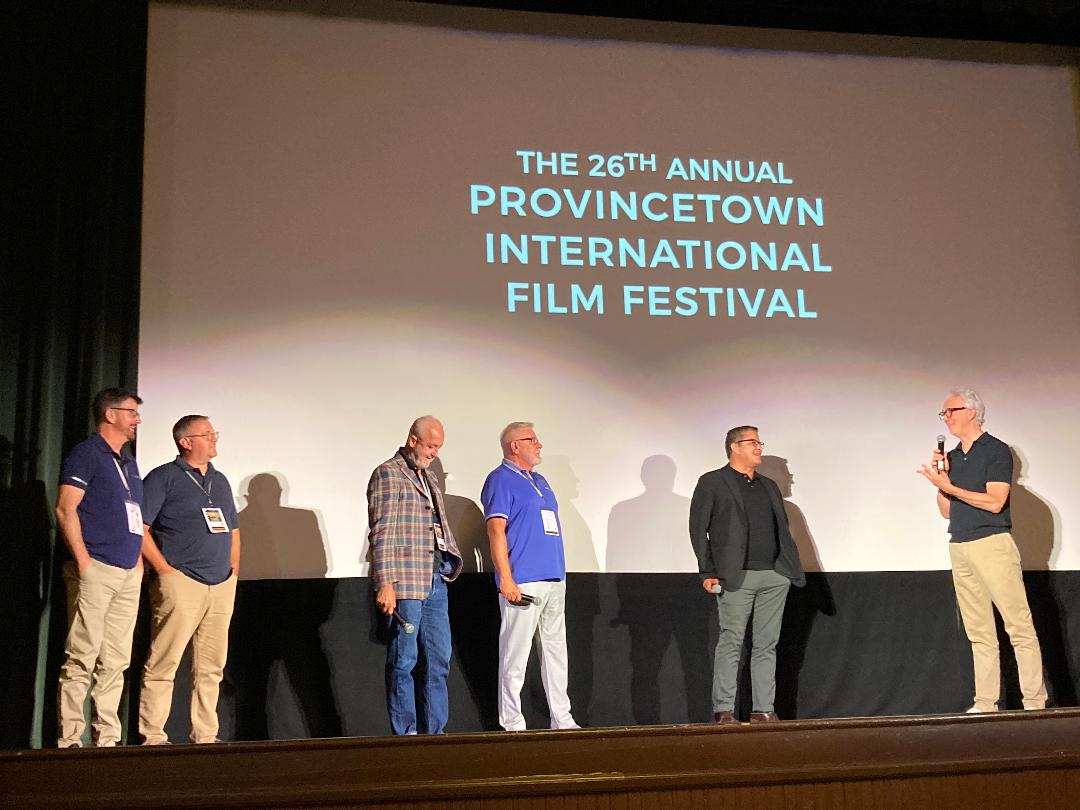
Thursday evening I attended the Schoolhouse party, traditionally held on Friday night, where the turnout was much lower than usual as a result of the date change. But the crowd included several filmmakers, and the godfather of the festival, John Waters. I arrived a little after 8 p.m. and was able to catch him as he was about to leave, and tell him how much we enjoyed the Pope of Trash exhibit at The Academy Museum in L.A., especially the excerpts of his first two films. If you are in Los Angeles do check it out before it closes – it is a brilliantly curated retrospective of his infamous career. I also spoke with the filmmakers who made the short The Featherweight, and a festival volunteer whose son worked on High Tide. I walked back to Strangers and Saints for a late night snack and then to my hotel.
On Friday morning I attended the Distribution Panel, featuring Eugene Hernandez from Sundance, producers Alex Mitow, Alex Stegmaeir, and Olivia Wingate, and PIFF publicity manager R.J. Millard. The audience was full of filmmakers, who enjoyed coffee and bagels and were anxious to hear about current industry trends. Stegmaier, producer of the award–winning film Mutt, and Queen of My Dreams, which I saw and loved at Toronto, also screening at PIFF, explained his distribution strategy. “We are basically making it up as we go; every project is different.” Mutt did the prestige festival circuit and then went to Netflix but he noted that post-pandemic, international distributors were not meeting the needs of filmmakers. He talked about reaching unexpected audiences and carving out rights for airlines to maximize returns.
Wingate, whose film We Strangers was screening later, talked about the importance of the festival circuit to build buzz for a film, and said press is key above all else. Millard framed the current contraction as just another step in the ongoing evolution of the film industry, starting with the dotcom crash and then continuing with the post-COVID rise in virtual screenings, stressing the need for filmmakers and their publicists to think differently in response. He noted that one strategy is to do indie screenings in smaller theaters, but cautioned that 99% of audiences are streaming content on their phones, so timelines are shorter, there’s less money and therefore less opportunity to get your film noticed.
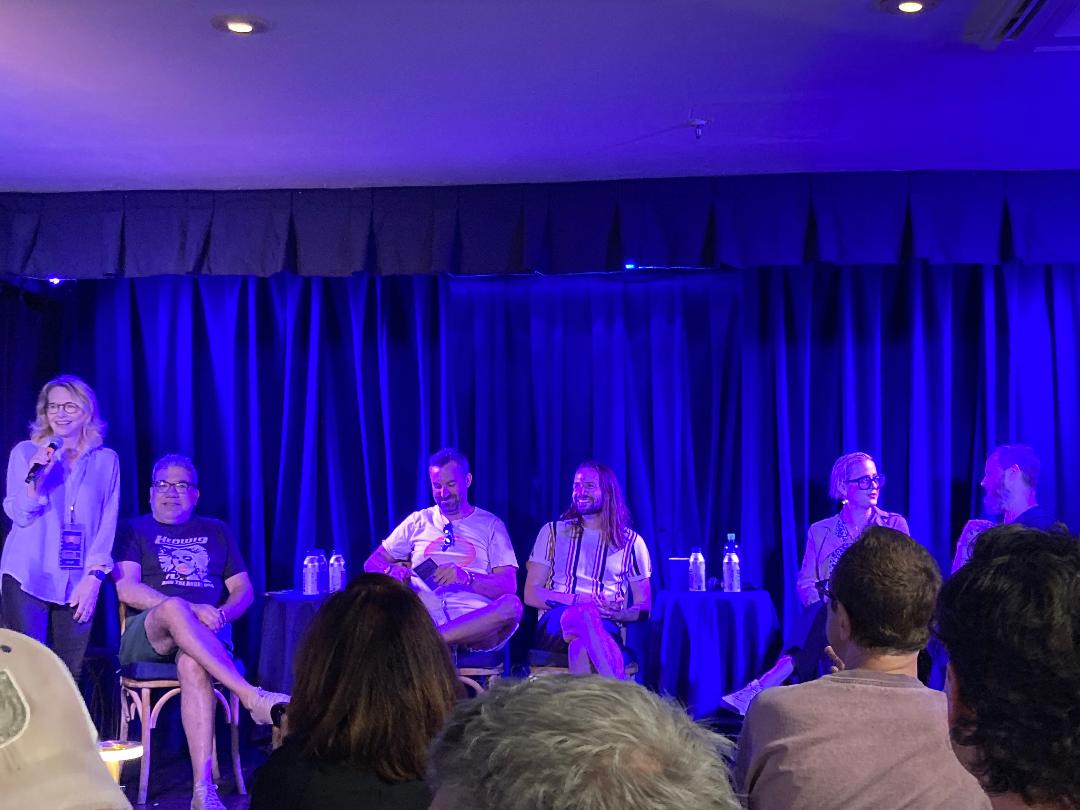
Mitow said he started Sherpa Films in response to the fact that most people don’t go to film festivals; we are the anomaly. The average person thinks festivals are only for industry professionals. He is interested in finding ways to provide theatrical screenings for indie films despite the challenges. Stegmaier agreed that both theatrical and festival runs add value to a film, even if the film will not make money at the box office. He said streamers want to piggyback off of these runs. Wingate said festivals are just one element of their strategy to build to ten screenings and become Oscar-eligible. She recommended that filmmakers reach out to small theaters directly to book screenings, circumventing industry gatekeepers.
Next the discussion turned to the recent financial difficulties of both festivals and small art house theaters. Hernandez talked about Hot Docs and Sheffield downsizing in 2024, and noted that two Sundance venues closed this year. Panelists confirmed that they are seeing this trend around the country, and Mitow stated the obvious: festivals need theaters. It was suggested that filmmakers must “eventize” screenings, with Wingate noting that festivals allow you to discover and capture your audience for an indie film’s eventual release, and Millard advising that more than ever, filmmakers need to be involved in the entire process of marketing and outreach for their films. “The media spend simply isn’t there any more,” he said.
The panel then took questions from the audience, with Todd Flaherty who appears in High Tide and directed last year’s Chrissy Judy, asking about international distribution. Millard explained that every country has its own system, making it tricky for filmmakers to navigate. The discussion concluded with all of the panelists concurring, perhaps not surprisingly, that the most important thing a filmmaker can do is to admit what they don’t know and find a producer and/or PR consultant who can help get the film out into the world. After the talk, I told Flaherty, whom I had met last year, about my experience with global distribution, which took several years to secure. Persistence is another requisite skill; his first feature deserves an international audience and I’m confident his film will find it.
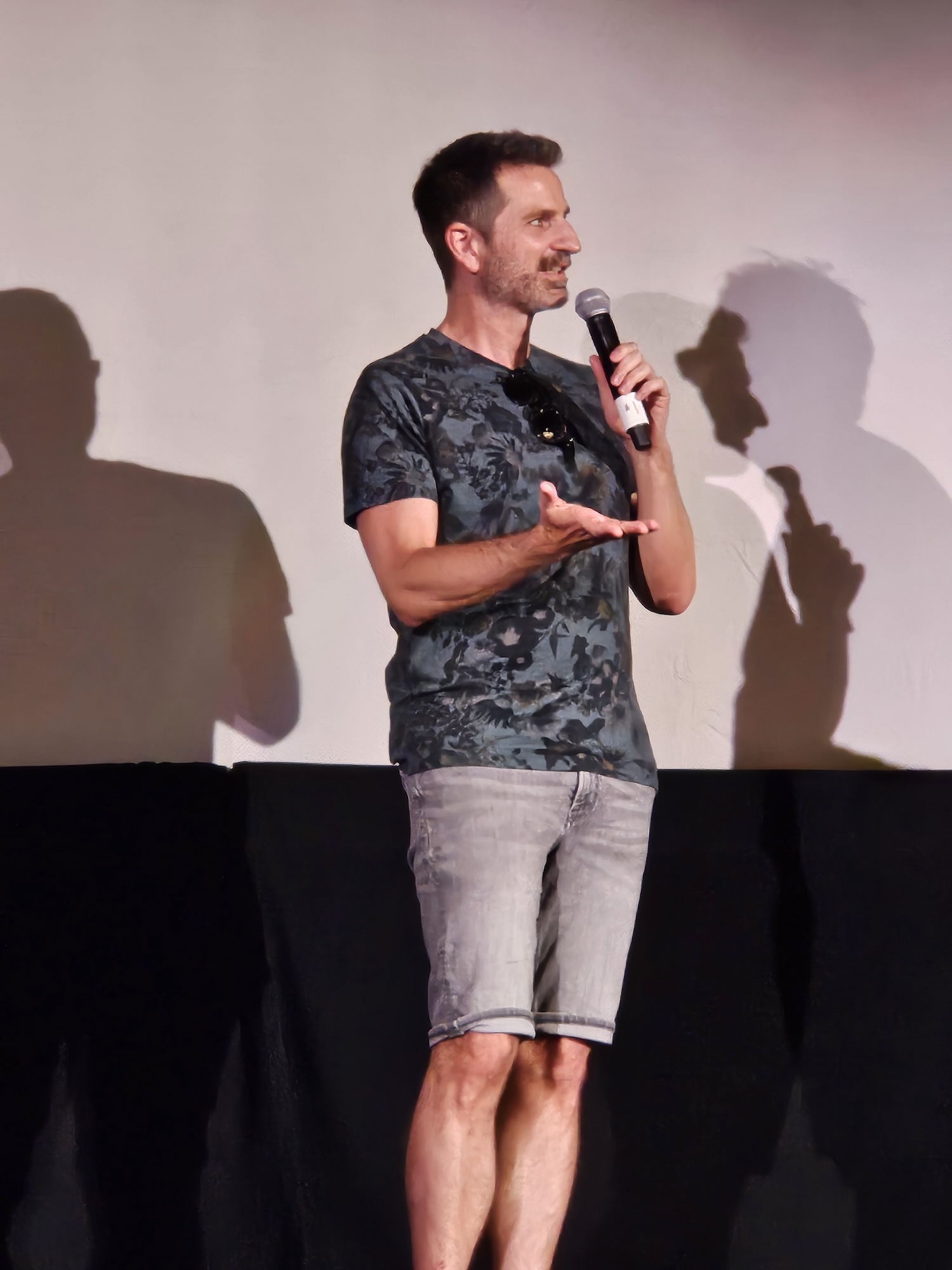
My first film scheduled for Friday afternoon was The Summer with Carmen, written and directed by Zacharias Mavroeidis, a meta meditation on love and friendship, framed by the backdrop of a gay beach in Athens, with gorgeous cinematography and witty dialogue. The film focuses on two best friends, Demos and Nikita, as they attempt to turn one summer adventure into a script for a film, allowing Mavroeidis to riff on the tropes and clichés of screenwriting advice from veterans like Syd Field and mimic the very structure of a traditional three-act narrative in the film’s chapters. The title character Carmen turns out to be a dog, which Demos acquires by default from his ex, who needs a sitter at first and then agrees to let his former boyfriend keep the pet. This becomes the tenuous thread connecting the ex and Demos, who struggles to let his lover go. Nikita as the BFF tries to protect Demos from humiliating himself and making the wrong choice, but in the end as with all rom-coms, boy gets boy, with a glimmer of hope thrown in: people really can change, especially with help of the lessons learned from a summer spent with a cute dog and a great script concept.
Next I opted to go to the shorts film program titled “It Takes a Village” which included two animated films. As is often the case with shorts films, I found most were marred by the melodrama, over-the-top and stilted dialogue, or extreme violence fantasies characteristic of student films. But two stood out and showcased directors with potential. Play Again, written and directed by Zen Pace, examines a young person’s grief over the sudden loss of their dad and things left unsaid between a father and teenager through a video game that they had played together. The director recreates the racecar driving game as a way to allow main character Javi to reconnect with their dad and reconcile their mixed emotions. The film is beautifully rendered and heartfelt without being maudlin. With two Emmy nominations and an impressive list of credits to date, this is a director to watch. Play Again premiered at the Seattle International Film Festival in The “Animation4Adults” section.
The second short film that I found intriguing was The Candy Factory, a documentary about a woman who turns an abandoned building into a thriving artist colony, creating a utopian refuge for painters, sculptors, and other visual artists in Brooklyn. With her pay-what-you-can rent structure, artist and owner Ann Ballentine handpicks every tenant, and fights to keep urban development from destroying their world. Brief but intimate portraits of the different residents give the viewer a behind-the-scenes look at this unique community and its eccentric founder.
Next I went back to the Town Hall for the Provincetown premiere of High Tide, written and directed by Marco Calvani. Shot in Provincetown, the film captures the exquisite light and landscape, as well as quiet moments of camaraderie between the off-season workers and residents of the town. The film follows Lorenco, played with subtlety and grace by Marco Pigossi, Calvani’s husband, as a Brazilian immigrant recently ditched by his boyfriend but in denial about the impossibility of reconciliation. We watch him leave unanswered phone messages and wait hopefully for a response, until he meets Maurice, an irresistible distraction who just happens to be sincere and well adjusted. James Bland is perfectly cast as the sensitive but self-assured end-of-summer fling, who falls in love with Lourenco in spite of his naïveté about relationships, and is finally able to win his heart. I had seen the film at SXSW film festival in March, and loved it. The cinematography is brilliant; it’s one of the first films I’ve seen that does justice to Provincetown’s breathtaking beauty, thanks to the eye of cinematographer Oscar Ignacio Jimenez. Equally potent is the score by Sebastian Plano, which perfectly sets the tone and reflects the passion of the story and its themes of the magic of love and acceptance.
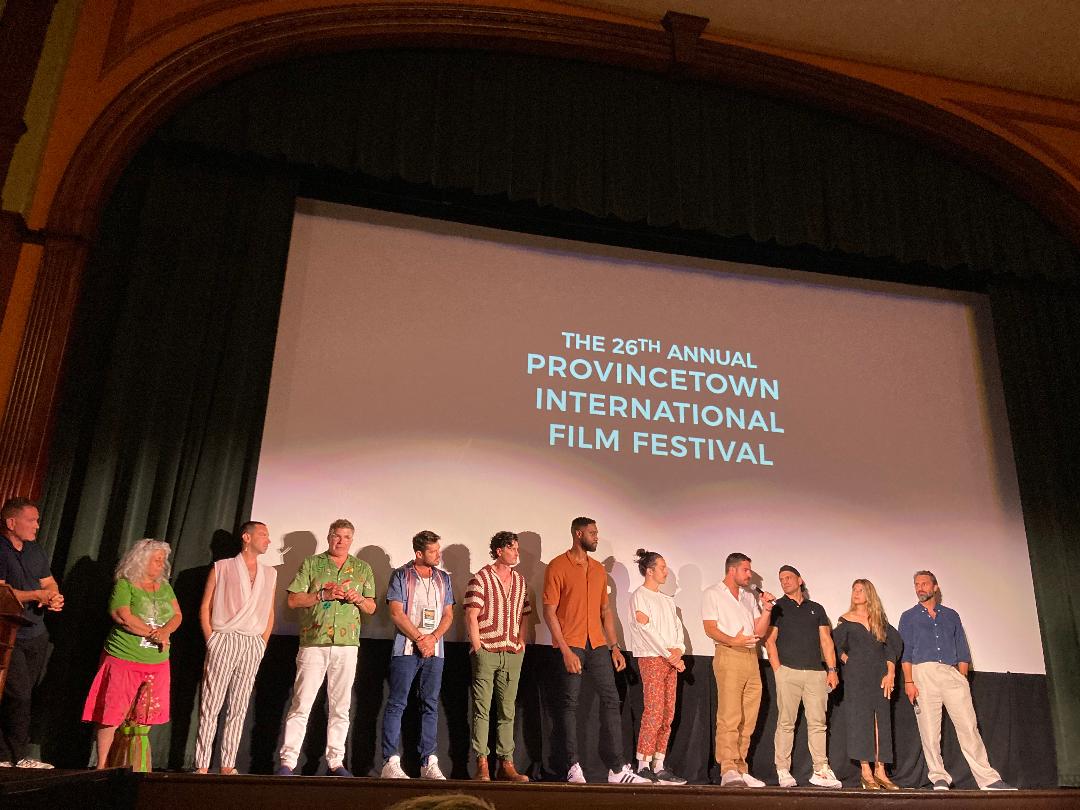
Programmer Andrew Peterson was in the audience in Austin, so I knew it would play at PIFF, but seeing the film in the theater filled with locals who worked on the film and business owners who offered their support for the production was really great. In the Q&A, with all of the stars including the two leads, Marisa Tomei, and Bill Irwin on stage, the director said the film was a labor of love. He said he came from a background in theater, and making a play is hard but making a film is a miracle. It really is “a love letter to the town; it’s a film about belonging”. Calvani said he worked on the script, in part inspired by his own experience of falling in love in Provincetown, for two years. Bland said he related to Maurice personally, “I love this character,” and Tomei explained that she has been working with Calvani for a while. In addition to actor Todd Flaherty and a host of Provincetown extras, Boston-based Alecia Orsini served as production coordinator and casting director Angela Peri helped secure local talent. They shot at The Red Inn and The A-House, and the result is an authentic representation of the community and an evocative sense of the late summer vibe.
The Friday night Industry Party was held at the Gifford House. With lots more filmmakers in town for the weekend, there was a capacity crowd with directors, actors, and producers including Christine Vachon in attendance. I chatted with Olivia Wingate about her theater experience in London and my new film project, All the Worlds’ a Stage, and told Marco Calvani how much I loved seeing High Tide with a Ptown crowd. PIFF board member Michael Colford joined the party and we caught up briefly before heading out.
Saturday morning I went back to the Town Hall to see Thelma, a heartfelt comedy picked up and recently released by Magnolia Pictures, and starring June Squibb as a 93-year-old grandmother who decides to fight back after being scammed out of her savings. The story is based on director Josh Margolin’s real grandmother, who just turned 103 and was introduced to Squibb on a recent CBS Sunday Morning segment. Another Sundance premiere, the film features an A-list cast with Parker Posey, Clark Gregg, Malcolm McDowell, and Richard Roundtree in his final performance, in an entertaining spoof of the Mission Impossible franchise. An unlikely but thoroughly endearing heroine, Thelma is a modern day role model, who drives a scooter with vengeance in this fast paced and very fun ride.
I made an appearance at the Filmmaker and Press luncheon at The Boatslip, home of the legendary tea dance, where Charlotte Robinson was recording interviews for her podcast, and Vachon and Waters held court on the back deck. After speaking with a few filmmakers and producers, and enjoying a sandwich and a mimosa, I headed to my next film, the documentary Merchant Ivory, a film that I was very much looking forward to seeing.
I had the good fortune to meet James Ivory at the Brattle Theatre years ago. He was quite charming and when I told him about my Shakespeare documentary, he shared his appreciation for Venice and the bard: his first film was a cinematic love letter to Venice and another early film, Shakespeare Wallah, was about the playwright’s influence in India. I was so happy when in 2018 Ivory received the Oscar for Best Adapted Screenplay for Call Me By Your Name. That recognition of his talent was long overdue.
Merchant Ivory is a comprehensive yet intimate look at the lives and collaboration of three great talents. Producer Ismail Merchant, director James Ivory, and screenwriter Ruth Prawer Jhabvala formed the core team that, along with composer Richard Robbins, created so many great films, each bringing their distinct personalities and styles to their extraordinary partnership. Director Stephen Soucy explained that he had collaborated with Ivory on an animated short about the music in the company’s films, and Ivory liked the film, so he pitched the bio doc concept to him. He did six interviews with Ivory over a period of three years at his home in upstate New York, and had access to a huge amount of archival footage. A fascinating look at the complex relationships between Merchant and Ivory as lovers and partners, and Prawer Jhabvala as their muse, the film reveals the way in which the synergy allowed them to compose work in much the same way musicians do. Merchant was a brilliant, if often reckless producer: a risk-taker who could charm anyone but was always on the brink of financial disaster. Maggie Smith said, “ I just remember the chaos and the curry!” Anthony Hopkins, who had sued the company, declined to be interviewed. In the film it becomes clear that Ivory was the calm voice of reason and caution on set and in their business dealings. Soucy said that he worked with Ivory to craft the film, showing him cuts and getting his feedback along the way. One thing Ivory was adamant about was that Merchant’s work as a director also be included in the story. At almost 2 hours long, it will test the attention spans of some viewers but there is so much to savor in this in-depth chronicle, your indulgence will be richly rewarded. For anyone who loved their lush adaptations of A Room with A view, Howard’s End, and the groundbreaking film Maurice, this film is not to be missed. It premiered at DOC NYC and will be released in theaters by Cohen Media Group on August 30th.
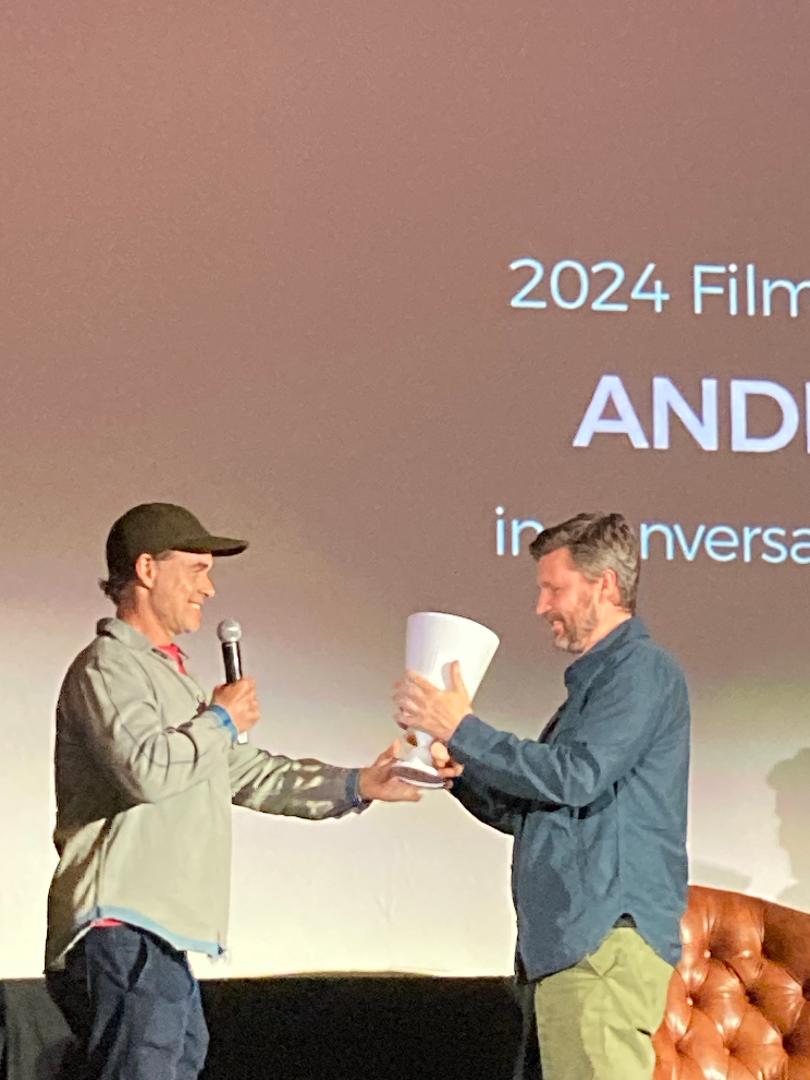
My next stop was the Filmmaker on Edge Awards event, where this year’s recipient, Andrew Haigh, was interviewed by John Waters. Director of this year’s BAFTA Award nominee All of Us Strangers, Haigh talked about his journey as a filmmaker, beginning with his first assistant editor job, which he said he got by being drunk at a bar. His first film was made for $5,000, and his breakout feature Weekend for $100,000. Waters asked if he had ever gotten any bad reviews for his films, and Haigh said, “Yes.” Richard Brody was not a fan of his early work, he’s been rejected by Cannes, and at the SXSW premiere of Weekend there were only three people in the audience. Asked if his films were at all autobiographical, the response was immediate. “Of course,” Haigh said. “There’s so much of myself in all of my films, including 45 Years and Lean on Pete.” He said he can’t make a film unless it means a lot to him. An adept and always entertaining interviewer, Waters shared his own filmmaking stories. He mentioned that although his films got rave reviews, Pink Flamingos was banned by the Vatican for being “indecent” and as the “Pope of Trash,” he weighed in on the current head of the Roman Catholic Church. “I was an altar boy,” Waters shared. Never one to miss an opportunity to spark controversy, he continued, “I was raised Irish Catholic. That pope, I hate him. And he’s ugly too.” Of course the audience loved this irreverent jab at the pontiff.
Haigh also talked about his work on the HBO series Looking and the differences in the two formats, from the size of the crew to the amount of labor involved. “It’s never fun to make a film,” Waters agreed. They discussed Haigh’s BBC TV series set in the Arctic Sea, The North Water, starring Colin Farrell. When Haigh described being stuck on the boat, surrounded by icebergs, and falling out of bed when trying to sleep onboard, Waters replied, “So manly! I won’t even take the ferry! It’s too scary – I’ve heard stories of entire families lying on the deck, covered in their own vomit.” The talk turned next to Haigh’s latest film, an evocative ghost story shot in the director’s actual childhood home in London. Waters asked, “Do we always turn into versions of our parents?” And Haigh explained that dad has dementia, so he forgets that his son is gay, and he has to come out to him again every time he sees him. “Was making the film Freudian in some way?” Waters pressed. Haigh said it was a tough film to make, but that Claire Foy and Jamie Bell were a bit like his parents. His mother came to the BAFTA awards, Haigh said, prompting Waters to reply, “My father saw A Dirty Shame and he said ‘It’s funny, but I hope I never see it again!’” Haigh talked about the fact his parents were divorced and he lived with his father: “so complicated.”
Waters noted the importance of music in the film and Haigh shared that he has loved the Pet Shop Boys since he was 12 years old. He just directed a music video for their song “A New Bohemia”. The conversation then returned to the most-asked question at the festival this year: is the movie business as we know it over? They agreed that theatrical is so important, and lamented the closing of art house cinemas around the country. Waters said we have to figure out how to change with the industry. “If it wasn’t tough, everybody would be a filmmaker. You get to tell people what to do and travel around the world!” Touché, your eminence. Waters praised Weekend, the film that introduced me to Haigh at the Brattle Theatre. “It’s an accurate representation of gay life, which is rare,” he said. During the Q&A, the two directors compared writing habits and rehearsals. “If an actor ever uses the word ‘journey’ I don’t hire them!” Waters warned. The event concluded with the presentation of the award.
Before going to back to my hotel to dress for the evening’s gala, I had a quick dinner at Patio, then checked in at the Filmmaker party at the Provincetown Brewing Company on Bradford Street, and talked briefly with producer Olivia Wingate again.
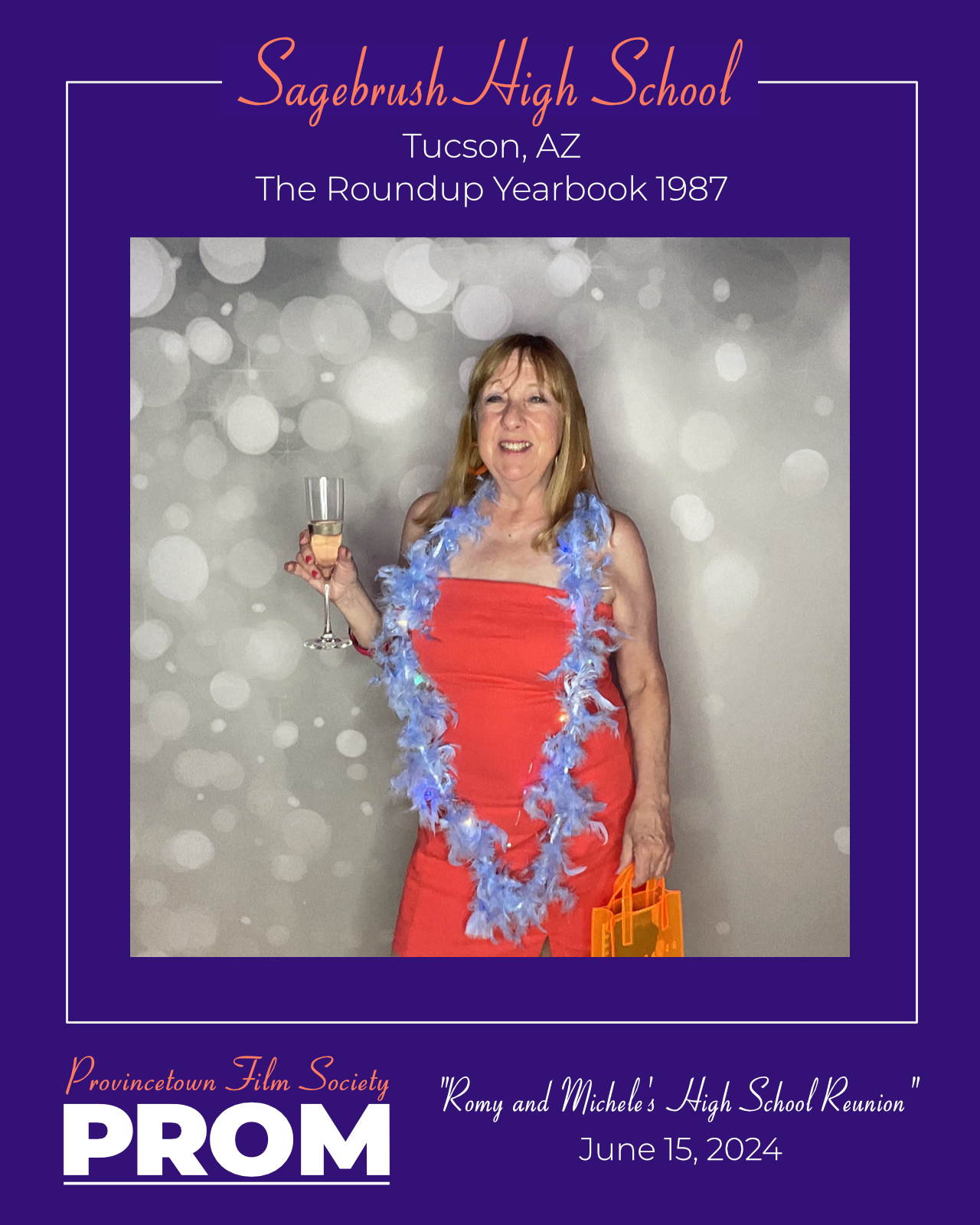
The finale for my festival experience was the Romy & Michele’s High School Reunion themed Prom: a fabulous fundraiser for the Provincetown Film Society held in the high school auditorium, which was decorated in 1990s glitz. I was invited to join Michael Colford’s table and happy to support my favorite festival. Champagne, appetizers, dancing, a photo booth, and lots of great prom attire made this a fitting coda to a great trip. Dressed in her signature oversized black blazer and baggy pants, Vachon stood out as the rebel she has always been: no disco attire or feather boas for her! After a medley of Donna Summer tunes and a few more great “last dance” numbers to end the night, we said goodbye to friends and colleagues.
This year’s festival was, like so many other fests, a bit scaled down: no printed film program, and the website no longer lists the films that screened, just one month later. Let’s hope that the success of the fundraiser helps defray costs for next year’s festival so that we can continue to enjoy a truly stellar line up of films and filmmakers in one of the most beautiful places in the world. Sunday morning I took an Uber to the ferry and returned to Boston to spend father’s day with my husband and son in the Seaport. A bit choppy on the ride home, but Provincetown is always worth the trip!
